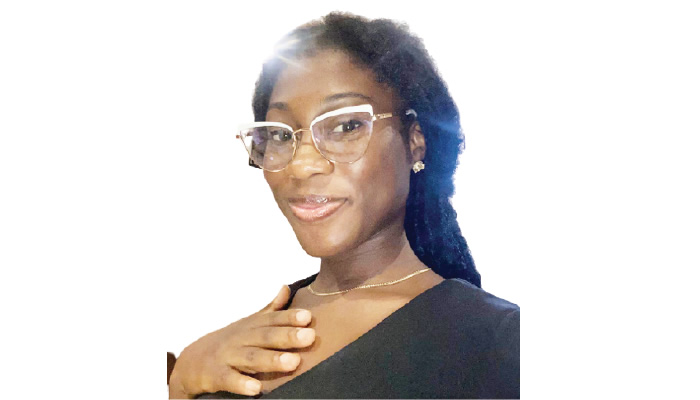
Twenty-two-year-old microbiologist, Ayomide Shola-Oni, tells TEMITOPE ADETUNJI how learning Spanish, Portuguese and French became easy for her while pursuing a degree in Microbiology
Can you tell us how you embarked on your language-learning journey to the extent of mastering Spanish, Portuguese and French while pursuing a degree in Microbiology?
As Ayomide Shola-Oni, I’ve always had a passion for languages ever since my time in secondary school. The beauty of different languages and cultures has fascinated me and it became a personal goal to learn multiple languages. Initially, I began my language-learning journey by teaching myself Korean, inspired by the captivating movies from that region. However, as I progressed through my education and focused on my studies, I had to put my language learning on hold temporarily.
When I finally gained admission to study Microbiology, my primary focus shifted to my academic pursuits. It wasn’t until I reached my 300 level in the university that I decided to reignite my language learning passion. Spanish caught my attention partly due to the influence of a close friend who inspired me to explore the language. In early 2020, just before the COVID-19 pandemic and subsequent lockdowns, I embarked on my Spanish learning journey.
The lockdown presented an unexpected opportunity for me to delve deeper into studying the Spanish language. I seized this chance to connect with a language institute based in the United States, which awarded me a scholarship to participate in their Spanish diploma programme. This period of dedicated language learning during the lockdown truly gave me an advantage and allowed me to make significant progress in my language skills.
Starting with Spanish, I immersed myself in various language resources, including textbooks, online courses and practice materials. I dedicated consistent time each day to study and practise speaking, listening, reading, and writing in Spanish. The structured curriculum of the diploma programme provided me with a comprehensive framework for learning and helped me to develop a strong foundation in the language.
While my focus has primarily been on Spanish, I also explored other Roman languages such as Portuguese and French to expand my linguistic repertoire. Although I may not have achieved fluency in Portuguese and French yet, I continue to study and practise every time.
Aside from learning, do you speak these languages? How fluent are you?
I do speak these languages, and I have made progress in my fluency. In Spanish, according to the proficiency chart guide, I would consider myself a B1 transitioning to a B2 level. This means I am moving from lower intermediate to higher intermediate proficiency. In Portuguese and French, I would classify myself as an A2 level, which indicates higher beginner proficiency.
Engaging native speakers has been particularly valuable in improving my pronunciation, vocabulary, and overall fluency. Their insights into cultural nuances and everyday language usage have been instrumental in my language-learning journey.
Moreover, one important aspect of my language-learning approach has been the willingness to make mistakes and learn from them.
What motivated you to take on this language-learning endeavour?
My motivation to embark on this language-learning endeavor stemmed from a desire to discover and pursue my true passions and aspirations. I had realised that I wanted more for myself than simply being an average person. Despite being a dedicated Microbiology student, I felt that something was missing, a deeper sense of fulfillment that I longed for. By embracing language learning, I have been able to expand my horizons, connect with people from diverse backgrounds and foster a deeper appreciation for the richness of human communication. It has allowed me to tap into my potential and unlock opportunities that I may not have otherwise encountered.
How did you manage to balance your language learning alongside your academic studies in Microbiology?
After the lockdown, I realised that I needed to find a way to pursue both my language-learning goals and complete my degree in Microbiology. To manage this, I made a conscious decision to temporarily reduce my language-learning activities while I focused on my academic responsibilities. Microbiology was my primary commitment and I understood the importance of dedicating sufficient time and energy to excel in my studies.
However, I didn’t completely stop learning or improving in languages during this time. Instead, I adjusted my approach and found ways to incorporate language learning into my daily routine without compromising my academic progress. I continued reading books, watching movies, and engaging in conversations with native speakers, albeit with reduced frequency and intensity.
Did you face any challenge in maintaining both areas of focus?
Yes, I did face challenges in maintaining both areas of focus, particularly when it came to balancing my passion for languages with my academic pursuit. As my passion for languages grew stronger, it became a mental battle to maintain equal interest and motivation in my Microbiology studies. It was important to find a balance and establish a schedule that allowed me to progress in both areas without neglecting either.
How have your language skills in Spanish, Portuguese and French enhanced your understanding of Microbiology?
The development of my language skills in Spanish, Portuguese, and French has indeed had a positive impact on my understanding of Microbiology. Learning and using multiple languages have enhanced my cognitive abilities and provided me with a set of valuable skills that directly translate to my studies in Microbiology. Language learning has strengthened my overall capacity for assimilation and comprehension. Through the process of learning different grammatical structures, vocabulary, and syntax, my brain has become more adept at quickly grasping and understanding new concepts. This mental agility has been transferable to the field of Microbiology, where complex scientific concepts and terminology can be challenging to comprehend.
Can you provide any specific examples or instances where your language proficiency has been advantageous in your studies?
Certainly! One specific example where my language proficiency has been advantageous in my studies of Microbiology is in the assimilation of biological names and terminology. Microbiology, like any scientific field, is filled with complex and specific vocabulary that can be challenging to remember and comprehend. However, my language skills have provided me with a solid foundation in memorisation and understanding linguistic structures. This has made it easier for me to tackle the intricate scientific names of microorganisms, biochemical pathways, and other biological entities.
Additionally, my language skills have provided me with opportunities to connect and collaborate with scientists and researchers from diverse linguistic backgrounds. Language proficiency has enabled effective communication, exchange of ideas, and collaborative efforts, which enhanced my overall learning experience in Microbiology.
Many people find it challenging to learn multiple languages simultaneously. Why is it so?
I agree that many people find it challenging to learn multiple languages simultaneously and there are a few common reasons for this difficulty; a lack of interest or motivation can be a significant barrier to learning multiple languages. Language learning requires consistent effort, dedication, and practice over an extended period. If someone does not have a genuine interest in the languages they are learning or the cultures associated with them, it can be challenging to maintain the necessary motivation to progress in multiple languages simultaneously.
Again, fear and the belief that learning a language is difficult can also hinder progress. However, it is important to note that while learning multiple languages can be challenging, it is not impossible. With the right mindset, effective learning strategies, and a genuine interest in languages, it is possible to overcome these challenges and make progress in multiple languages simultaneously.
Can you share some tips with language learners aspiring to do the same?
Define your language learning goals for each language and make them specific and achievable. Having a clear direction will help you stay focused and motivated throughout your language-learning journey. Establish a regular study routine that fits your schedule and stick to it. Consistency is key in language learning. Dedicate a specific amount of time each day or week to practise each language. Also, surround yourself with the target languages as much as possible. Read books, listen to podcasts or music, watch movies or TV shows and engage in conversations with native speakers. The more you expose yourself to the languages, the faster you’ll progress.
The learner must engage in language exchange programmes or find language exchange partners to practise conversational skills. This provides an opportunity to speak and listen to the languages in a real-life context while also helping others learn your native language. Also, the language learner should take advantage of textbooks, online courses, language learning apps, flashcards, and other resources specific to each language.
How did learning Spanish, Portuguese and French impact your overall cultural awareness and perspective?
Learning Spanish, Portuguese, and French has had a profound impact on my overall cultural awareness and perspective. It has opened my eyes to the richness and diversity of different cultures; it has deepened my appreciation for people from various backgrounds. Through learning these languages, I have become more curious about the history, traditions and customs of the communities that speak them. It has allowed me to explore and understand different perspectives, broadening my worldview and fostering a sense of empathy and respect for other cultures.
I have come to appreciate the unique cultural nuances embedded within each language. From the vibrant celebrations of Spanish-speaking countries to the poetic expressions of Portuguese literature and the sophisticated art and cuisine of the French, each language has offered me a gateway into the rich tapestry of human experiences.
Did it open up new doors for you in terms of travel, connecting with people from different backgrounds or exploring diverse literature?
I have been able to explore literature comfortably in Spanish and Portuguese, which has allowed me to delve into the literary traditions and works of authors from those cultures. In terms of travel, while I haven’t had the opportunity to do so yet, learning these languages has prepared me to engage with locals and navigate different countries more easily once I have the chance. It has given me the confidence to communicate and connect with people from different backgrounds, fostering meaningful interactions and cultural exchanges.
Unfortunately, the first opportunity I had to travel coincided with the global lockdown due to the pandemic. As a result, travel restrictions and safety concerns prevented me from exploring the countries where these languages are spoken. However, I remain eager and excited about the prospect of future travel experiences, where I can fully immerse myself in the local culture, connect with people and put my language skills into practice.
Were there any moments of doubt or frustration during your language-learning journey?
Yes, there were moments of doubt and frustration during my language-learning journey. There were times when it felt like I wasn’t making any progress or improving in the languages I was learning and it became quite frustrating. Additionally, there were occasions when I made numerous mistakes, which made me question my abilities and hindered my confidence. To overcome these challenges, I adopted a few strategies. First and foremost, I reminded myself not to give up. I also sought ways to re-motivate myself.
What kept you motivated and committed to achieving fluency in three languages while pursuing your microbiology degree?
Passion and a genuine love for languages were the driving forces that kept me motivated and committed to achieving fluency in three languages while pursuing my degree in Microbiology.
Looking back at your language-learning journey, how has it influenced your career aspirations?
Looking back at my language-learning journey, I can confidently say that it has had a profound influence on my career aspirations. The language proficiency I gained opened doors to various opportunities and significantly shaped the trajectory of my professional path.
One notable opportunity that arose from my language proficiency was the chance to work as an interpreter for a non-governmental organisation. Being able to bridge language barriers and facilitate communication between different parties was an incredibly rewarding experience. It highlighted the importance of language skills in promoting understanding and making a positive impact in various fields.
You are an undergraduate, which school and what level?
I recently completed my undergraduate studies at the University of Lagos. This year has been quite eventful and fulfilling as I accomplished my academic goals and earned my degree.
What are your memorable experiences?
One of the most memorable experiences for me was the process of figuring out what I truly wanted to do in life. Exploring different fields, including languages and microbiology, allowed me to discover my passion for both and helped me shape my career aspirations. The opportunities I’ve received through language learning have been incredibly memorable.
Graduating from the University of Lagos marked a significant milestone in my life. The culmination of years of hard work, dedication and growth made it a truly memorable and fulfilling experience. It was a moment of pride and celebration, not only for me but also for my family and loved ones who supported me throughout my academic journey.
Have you won any awards based on your language-learning achievement?
Yes, while I have not received any physical awards for my language-learning achievements, I am honoured to share that I was certified as one of the best-graduating students from the language institute. This recognition holds significant meaning for me, as it represents the dedication and hard work I invested in mastering multiple languages during my academic journey.
Being certified as one of the top students in the language institute validates the effort I put into developing my language skills. It is a testament to the passion and genuine love I have for languages, as well as the commitment I made to excel in my language-learning endeavours.
What have been your parents’ reactions?
My parents’ reactions to my language-learning journey have been pride and joy. Initially, like any concerned parents, they were a bit skeptical about my decision to pursue multiple languages alongside my academic studies. They wanted to ensure that I could manage my time effectively and excel in my core field of Microbiology. However, as they witnessed my dedication, passion and progress in language learning, their skepticism turned into admiration.
Most importantly, my parents have been a constant source of emotional support. Their belief in my abilities and their love for me have been a driving force that keeps me motivated, even during challenging times.
What position are you in the family?
I hold the position of the firstborn in my family. Being the eldest child comes with its unique set of responsibilities and privileges.
Are you in a relationship?
Yes, I am currently in a relationship.
What are your plans after school?
Now that I’m done with my academic journey, my ultimate goal is to become a skilled and licensed interpreter. I am passionate about languages and my dream is to master at least 40 languages, which will enable me to facilitate effective communication between people from diverse linguistic backgrounds. To achieve this ambition, I am planning to enroll in a reputable school for interpreters. This specialised training will provide me with the necessary skills, knowledge, and certifications to excel in the field of interpretation.





